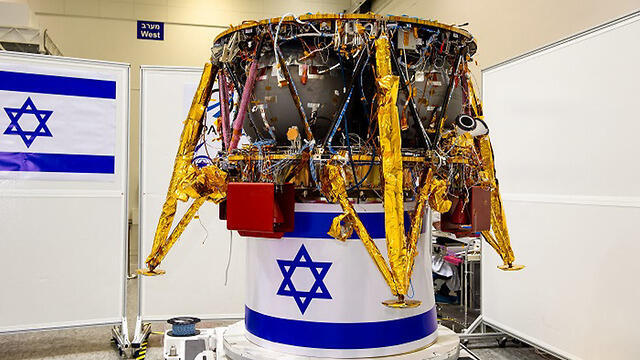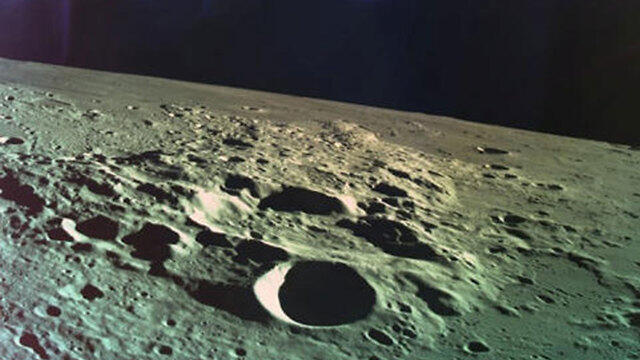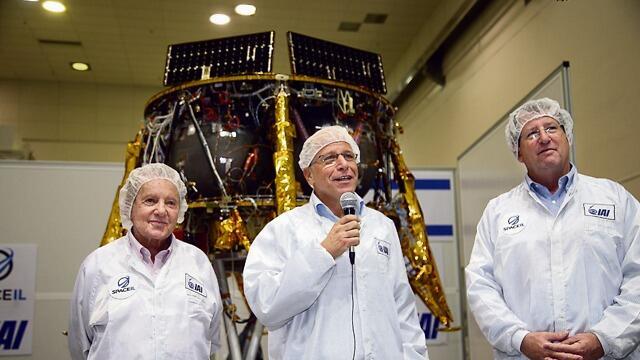Getting your Trinity Audio player ready...
Legend has it that when George Mallory was asked why he decided to climb Everest, the British mountaineer replied: "Because it's there."
and Twitter
Mallory was never hailed as the first person to reach the summit of the highest mountain in the world. He vanished in 1924 and his frozen body was only discovered 75 years later some 250m from the top.
3 View gallery


The Beresheet spacecraft (Photo: SpaceIL/IAI)
(צילום SpaceIL/התעשייה האווירית לישראל. )
Whether he made it or not is one for historians to debate, but it led New Zealander Sir Edmund Hillary and Nepalese Sherpa Tenzing Norgay to claim the title of the first people to scale Mount Everest and return alive in 1953.
A few years later, on May 25, 1962, President John F. Kennedy announced that by the end of the decade that the United States would land a man on the moon.
"We choose to go to the moon. We choose to go to the moon in this decade and do the other things, not because they are easy, but because they are hard," the president said in his historic speech. Kennedy was murdered, but his vision came true in 1969.
When the Israeli spacecraft Beresheet began its journey to the moon, there was quite a bit of criticism: why spend so much money to send a spacecraft to the moon instead of investing in health, education and welfare?
Similar criticism was heard when the manned flights to the moon began 50 years ago. The Apollo project was dozens of times more expensive than the modest Israeli spaceship, and was fully funded by the government.
3 View gallery


Beresheet's last image of the moon before it crashed into the lunar surface
(צילום: רויטרס)
When Beresheet slammed into the moon last week, the internet was flooded with jokes about Israeli drivers, Benjamin Netanyahu's election win and even the misstep by politicians Naftali Bennett and Ayelet Shaked that saw them crash out of the Knesset.
But despite the criticism and the mockery, it is reasonable to assume that if Beresheet had completed its mission, raising the flag of Israel on the moon and making us the fourth nation ever to land a spaceship there, it would have filled us with tremendous pride, crossing political and sectoral boundaries.
True, Likud voters would say that this achievement was down to Benjamin Netanyahu; Meretz and Blue and White voters would claim that he and Sara simply pushed their way into the control room in Yehud, since this was a purely private enterprise; and Shas and United Torah Judaism voters would say that God's hand was behind the success.
Yet for a few hours, perhaps even days, we would all have felt proud. Each of us would feel that we played a part in the achievement, even though most of us have no idea how to update software on the computer, let alone send a spaceship to the moon.
For a few hours, perhaps even days, we would all have been Israeli together. Not rightists or leftists; not "Just Bibi" or "Just not Bibi" - just Israelis. And in these bad times, that's no small matter.
At the weekend, Morris Kahn, the billionaire who sponsored the project, announced the launch of Beresheet 2 and promised that the Israeli flag would stand yet on the moon. Netanyahu also promised that the state will participate in the project this time. Here's hoping he will keep his word.
True, a moon landing will not add a single bed to a hospital ward or help a single disabled person who lives on a meagre allowance, but it will inspire hundreds of thousands of young people and prove to them, and to all of us, that the sky really is the limit.
It is as inspiring as the Israeli scientists who conquered their own personal Everest this week when they created a living heart using a 3D printer.
If you want to save the dying health system and the collapsing welfare system, I can propose a variety of alternative sources of funding. But that is a subject for another time.
Of course, there is another reason why Israel should go to the moon. Because it is there.
Excelsior.


